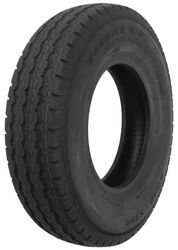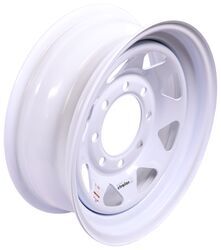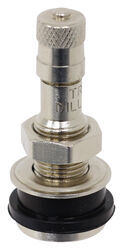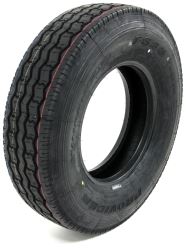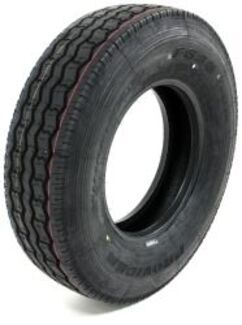
How to Determine the Weight Rating of a Wheel for Load Range G Tires
Question:
How do I tell the load rating of the wheel not the tire but the wheel the tire is mounted. Question. I have a camper/5thwheel with f rated tires. Can I safely put g rated tires on it at the tire recommended pressure?
asked by: Bill
Expert Reply:
A common misconception about tires and wheels is that they have seperate weight ratings. Although some wheels may have a "weight rating", they are really rated for whatever size tire fits on them.
The weight rating of a wheel is actually tied to the type of valve stem it has. If the valve stem is rated for a lower psi rating then the "weight rating" of the wheel will be lower. For example;
The valve stem part # AM20904 is rated for psi up to 80 while the part # AM20906 has a psi rating of over 100. If the Dexstar Steel Spoke Trailer Wheel # AM20750 had a tire on it that was rated for a lower psi and you wanted to change out the tire with one that had a higher psi rating you would need to change out the valve stem to the metal one.
Since tires with a Load Range F, like part # AM10501, are likely to have a psi rating of over 100 you would not need to change out the metal valve stem if you installed a tire with a Load Range G, like part # TTWPRG235R16, which has the same psi rating.
Most likely the psi rating that you are looking at for either tire size is at least 80 if not over it. In either case, as long as you have the metal valve stem installed on your wheel you are good to go.
When you are asking about the recommended psi, you always want to keep your tires at the psi specified by the tire manufacturer. They have tested the tires and found that it performs best at that psi. Anything more or less means that the load rating will be unknown and you are more likely to blow a tire that way.
I have attached an FAQ on trailer tires that you can check out as well.

Products Referenced in This Question
Karrier ST235/85R16 Radial Trailer Tire - Load Range F
- Trailer Tires and Wheels
- Tire Only
- Radial Tire
- Load Range F
- 235/85-16
- 16 Inch
- M - 81 mph
- Kenda
more information >
Dexstar Steel Spoke Trailer Wheel - 16" x 6" Rim - 8 on 6-1/2 - White Powder Coat
- Trailer Tires and Wheels
- Wheel Only
- 16 Inch
- 8 on 6-1/2 Inch
- Steel Wheels - Powder Coat
- Dexstar
more information >
Americana Metal, Bolt-In Valve Stem - 1-1/4" Long
- Tire Repair Tools
- Valve Stems
- Bolt-In Stem
- 10 Inch Tire
- 12 Inch Tire
- 13 Inch Tire
- 14 Inch Tire
- 15 Inch Tire
- 16 Inch Tire
- 17.5 Inch
- Chrome
- 200 psi
- Silver
- Americana
more information >
Provider ST235/85R16 Radial Trailer Tire - Load Range G
- Trailer Tires and Wheels
- Tire Only
- Radial Tire
- Load Range G
- 235/85-16
- 16 Inch
- M - 81 mph
- Taskmaster
more information >
Product Page this Question was Asked From
Americana High Pressure Rubber Snap-In Valve Stem - 1-1/2" Long - Up to 80 psi
- Tire Repair Tools
- Valve Stems
- Snap-In Stem
- 8 Inch Tire
- 10 Inch Tire
- 12 Inch Tire
- 13 Inch Tire
- 14 Inch Tire
- 15 Inch Tire
- Rubber
- 80 psi
- Black
- Americana
more information >
Featured Help Information
Miscellaneous Media

Continue Researching
- Q&A: Highest Rated 16 x 6 Steel Trailer Wheel in Silver Mod
- Shop: Trailer Hitch
- Shop: TorkLift SuperHitch Magnum Trailer Hitch Receiver - Custom Fit - Class V - 2-1/2"
- Video: Fulton Trailer Fenders - Top and Side Step - F008595-2 Review
- Shop: Americana Metal, Bolt-In Valve Stem - 1-1/4" Long
- Shop: Vesper Steel Modular Trailer Wheel - 16" x 6" Rim - 6 on 5-1/2 - Black
- Q&A: Recommended Leaf Springs for 4,400 lb Axle Based on Axle Position and Hanger Locations
- Q&A: Leaf Spring Recommendation for 4,400 lb Trailer Axle
- Q&A: Maximum Air Pressure of Dexstar 16 x 6 Trailer Wheel
- Video: Review of TorkLift Camper Tie-Downs - Complete Truck Camper Stand - TLA7012
- Shop: Suspension Enhancement
- Q&A: Can a Rear Sway Bar be Installed with Firestone Air Bags?
- Shop: Yates Side Guide Roller for Boat Trailers - Heavy-Duty Rubber - 12" Long - 1/2" Shaft
- Shop: Yates Endcap for Side Guide Rollers - Heavy-Duty Rubber - 1/2" Shaft - Qty 1
- Shop: Yates Endcap for Side Guide Rollers - Heavy-Duty Rubber - 1/2" Shaft - Qty 1
- Shop: Yates Side Guide Roller for Boat Trailers - Heavy-Duty Rubber - 9" Long - 1/2" Shaft
- Search Results: g rated trailer tire
- Article: Trailer Tire Sizing
- Q&A: How Much Clearance is Needed to Account for Suspension Travel on a Trailer
- Q&A: Choosing Between ST and LT Tires for a 5th Wheel Trailer
- Article: How to Mount a Truck Bed Camper
- Shop: Base Plate for Tow Bar



